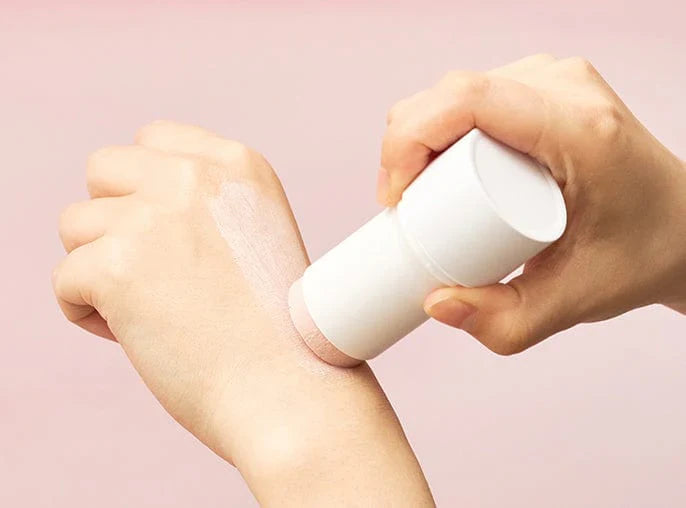If you're still unsure how to start a skincare routine, the best way is to discover your skin type. But how do you identify your skin's characteristics to achieve a beautiful and healthy complexion?
We've prepared this complete guide to help you with this discovery and the main daily care tips to keep your skin radiant. See below.
Determine your skin type.
Normal skin : generally does not have excessive shine or dryness and produces oil in the ideal amount.
Dry skin : It generally has little natural oil. It has a dry, rough appearance and lacks shine.
Oily skin: It features enlarged pores, with a high chance of developing blackheads and pimples. Oiliness is usually concentrated in the "T-zone" of the face (forehead, nose, and chin).
Combination skin: It can cause dryness in specific areas of the face and oiliness in other areas, such as the T-zone (forehead, nose, and chin).
Sensitive skin: it's not a skin type. Sensitivity can occur in any of the skin types mentioned above. This condition can occur for various reasons, including climate changes, reaction to acne treatment, skin diseases, lack of hydration, among others. It usually leaves the affected area red, burning, and itchy.
Morning routine
For a basic morning skincare routine, follow these steps:
- Cleanse your face with a gentle cleanser that doesn't completely strip away natural oils.
- Apply a serum, moisturizer, or oil.
- Apply sunscreen.
The types of products you choose should be based on your skin type.

Cleansing: Choose something gentle, like micellar water, which contains molecules that remove dirt. Simply apply it to your skin; no rinsing is necessary. You can also use a foaming cleanser.
Serum: Serums are available for various skin treatments. Choose one that meets your needs, whether it's anti-aging or moisturizing. Look for ingredients like antioxidants, nourishing oils, or retinol.
Moisturizer: Just like with your serum, choose a moisturizer that meets your needs and contains antioxidants in its formula.
Sunscreen: Apply sunscreen every day before leaving home. Use a good-textured, water-resistant sunscreen with SPF 30 or higher. You can opt for a moisturizer containing sunscreen as the final step in your skincare routine, before makeup, if applicable.
Dry skin
Cleansing: Choose a gentle cleanser, preferably fragrance-free, and use just enough to create a light lather. Pat dry with a towel and immediately apply moisturizer.
Serum and moisturizer: The key to preventing dry skin is retaining moisture. Use a cream for dry skin. Ingredients to look for in these products include: Hyaluronic acid, glycerin, and lanolin.
Sunscreen: Use a fragrance-free sunscreen with SPF 30 or higher.
Oily skin
Cleansing: Use a foaming cleanser that does not contain alcohol or oil. You don't need harsh cleansers that strip the skin of its natural oils. Choose products that remove dirt and oil and are gentle on the skin, thus avoiding possible irritation.
Serums and moisturizers: Avoid any oil-based serums or moisturizers. Choose those labeled non-comedogenic – and fragrance-free for less irritation.
Sunscreen: Sunscreen can aggravate acne-prone skin and cause breakouts, but it's essential for protecting your skin. Choosing barrier sunscreens based on zinc oxide or titanium dioxide can help. Be sure to choose a product labeled oil-free.

For combination skin, it may be necessary to treat specific dry or oily areas with different products. Otherwise, use a gentle foaming cleanser and apply moisturizer and sunscreen daily. Avoid any products that cause breakouts or dry skin.
Sensitive skin

Cleansing: Using an oil to cleanse sensitive skin can help. A pure oil, such as argan, coconut, or jojoba, can dissolve dirt and grime without additives that can irritate the skin. You can also use a very gentle liquid cleanser without added fragrance.
Serum and moisturizer: the fewer products you use if you have sensitive skin, the easier it will be to identify what might be causing irritation. Choose a single product that has few ingredients and is fragrance-free. If your skin burns after using the product, discontinue use immediately.
Sunscreen: A sunscreen with a barrier base containing zinc oxide or titanium dioxide is a great option. Avoid products with fragrances.
Adverse effects
Discontinue use of any skin product that results in burning, itching, redness, swelling, or pain.
Night Routine
For a basic nighttime skincare routine, follow these steps:
Cleanse your skin, using a makeup remover product if necessary.
Apply a facial toner, spreading it all over your face.
Apply a night serum or moisturizer, or both if desired.
Click on your skin type to see recommended products.
Normal skin
Toner: Choose a toner indicated for normal skin. Toners containing hydroxy acids help with ultraviolet ray damage, while those with antioxidants – such as vitamins C and E – can treat free radical damage and scarring.
Serum or moisturizer: Choose a serum or moisturizer for nighttime use. A cream based on vitamin A, for example, can help with collagen production, while retinol helps combat signs of aging.
Dry Skin
Toner: Skip this step or use a toner that offers hydrating benefits. Avoid alcohol-based toners.
Serum or moisturizer: oil-in-water formulations, such as lightweight gels, lotions, and serums, are ideal for normal to dry skin.
Oily Skin
Toner: Use a toner that is gentle and balanced, avoiding alcohol- or oil-based toners. Look for non-comedogenic brands.
Serum or moisturizer: choose an oil-free and non-comedogenic moisturizer. Opt for products with antioxidants, such as resveratrol, quercetin, and cinnamic acid, to help reduce the appearance of inflammation.
Combination Skin
For nighttime skincare for combination skin, choose products that won't aggravate or irritate the skin condition. Salicylic acid is a great active ingredient for cleansing combination skin. Always apply thin layers of product.
Sensitive Skin
Toners: skip this step or use a very mild, natural toner.
Serum or moisturizer: moisturizers containing humectants – such as glycerin and hyaluronic acid – work well for sensitive skin. Preventing moisture loss with creams containing barrier molecules, such as petroleum jelly and dimethicone, can also help.







